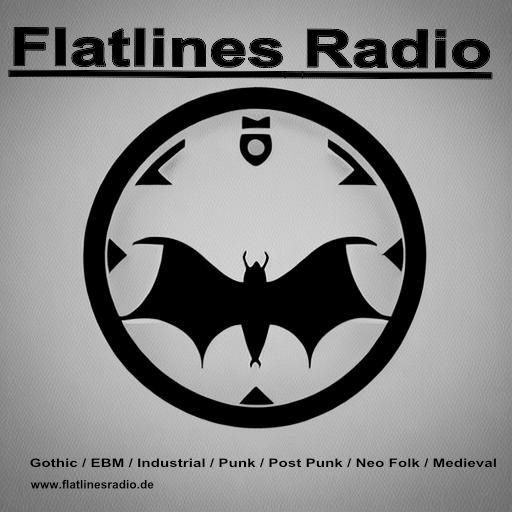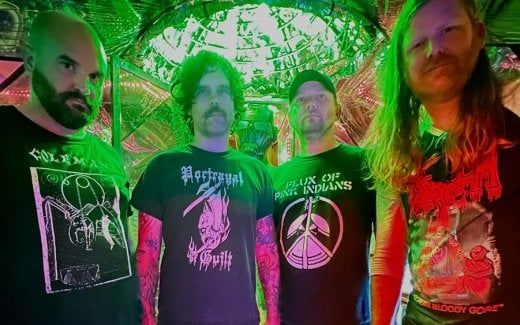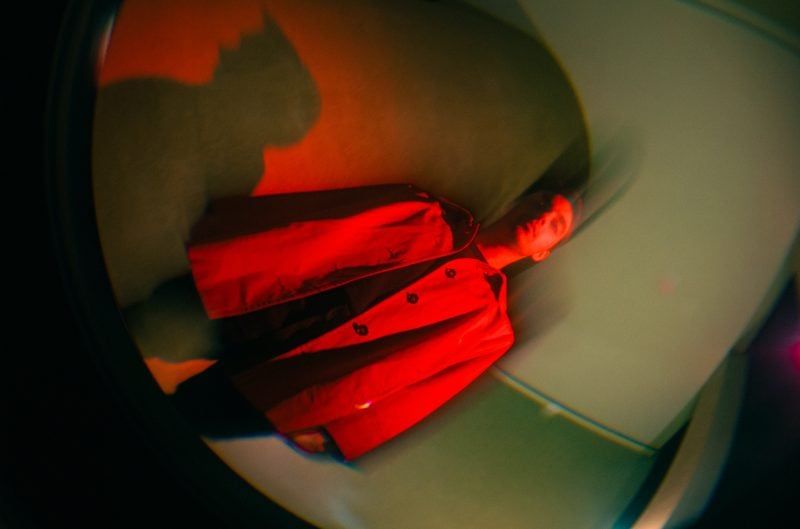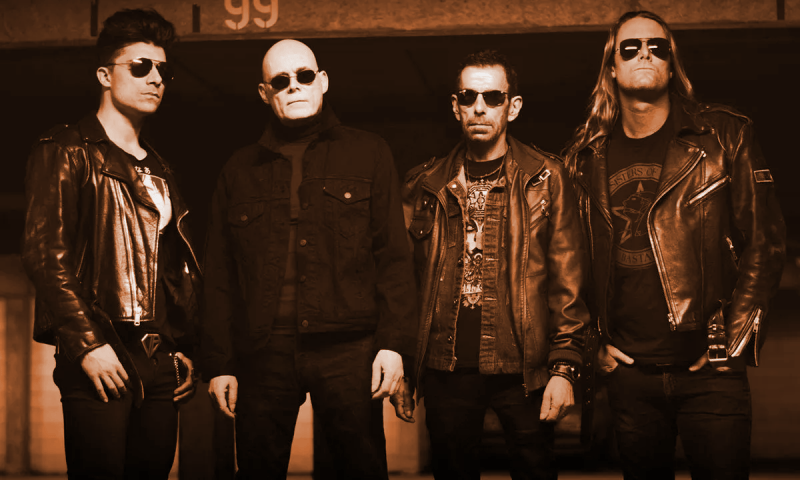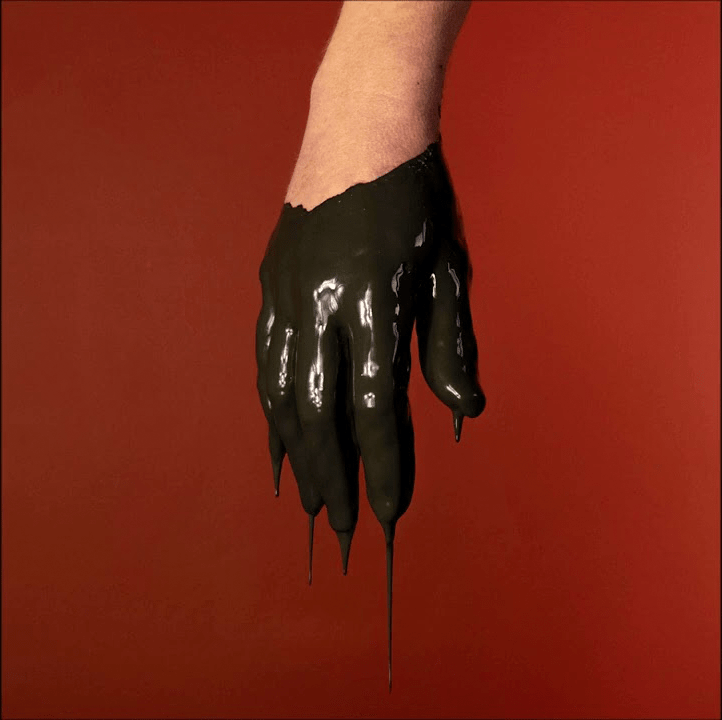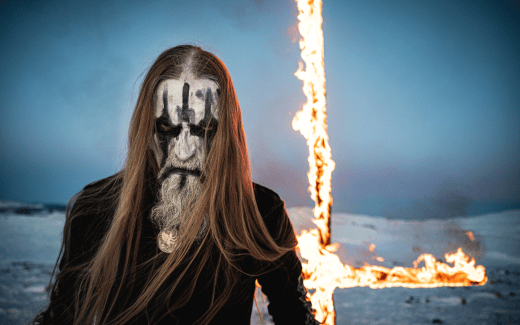
Follow us on social media
Nag Discusses Tsjuder’s Latest Album, Helvegr
Follow us on social media

The legendary Tsjuder has a body of work that’s since earned them a reputation as one of the genre’s most revered and influential acts. Formed in 1993 by Berserk and Nag, the band’s sixth album Helvegr is a raw, brutal, and fearless ode to authenticity that crushes listeners with the weight of a classic. It delivers exactly what you want from black metal while transporting you to a whole new underworld of fire and ice. So needless to say, we liked it a lot.
Nag has had a glorious career with Tsjuder and beyond, so we were naturally honored to have the opportunity to speak with him about Helvegr prior to its release.
I would like to start by saying that l was completely blown away by Helvegr. I really love the album. You actually told Greece’s The Gallery that Helvegr is the record that best represents Tsjuder. That’s a huge statement, considering all of your past work. Could you please tell me a little bit about the creative process?
First of all, in Tsjuder, we have made music in several different ways. The way we started out is that Draugluin and I sat together. He has most of the riffs because he’s a guitarist. I also bring riffs to the table. We make music together. That’s how we started the band. That’s the way we have worked for many-many years. We have done some albums a little differently. For some albums, Draugluin has made mostly everything. Antiliv is actually the only album that we made mostly in the rehearsal room.
For Helvegr, the plan was to make the album in the rehearsal room, and we tried to do that. I brought riffs, and Draugluin brought riffs, and we tried to make songs. But we figured out that me and Draugluin think alike, but Anti-Christian wanted to do something different. We struggled a little bit with that. And, yeah, eventually, Anti-Christian had to leave the band because it didn’t work anymore. During that time, I think that Draugluin was pretty fed up, so he started to make music just by himself. That’s how most of the album happened — Draugluin made the music, and, of course, he sent what he was making to me. I made comments and was part of making some minor changes, but it was mainly written by him.
Do you think that maybe the frustration helped make this such an incredible album?
Not really because many of the riffs were already present. I think Draugluin had a vision of what he wanted to do, and he just decided that in order to make a new album he had to do something. So, I don’t think it changed anything musically. The way it turned out was the way we wanted it to be in the first place, but it was not what Anti-Christian wanted.
I do have to say that Anti-Christian is amazing. He’s been a part of so many cool bands. You’ve been blessed with a lot of great drummers. Jontho, for example. Blod. Jon Rice, who you’re working with now, is obviously fantastic. And there was also Desecrator. He returned to help you write the lyrics to the title track. Seidemann contributed some lyrics as well. He made a guest appearance, as did Pål Emanuelsen, who also produced, mixed, and mastered Helvegr. So, is there anything that you can tell me about how the lyrics were composed this time around?
I lost count of how many lyrics Draugluin wrote and I wrote. I think that what we tried to do started on Antiliv. Back in the early days, I would write lyrics, and there would be no changes. But, let’s say, for the last 10 years, I can make lyrics that are not complete. I can send them to Draugluin and ask: “What do you think about this? Is there something we should change?” He will give his feedback and maybe make changes or suggestions. And it’s the same the other way around. Whenever he writes something, he sends it to me, and I give him feedback on it. That’s how we work with lyrics.
Regarding “Gods of Black Blood” with Seidemann, the lyrics were actually already done. I was recording vocals, and I asked Seidemann if he wanted to join me to help out and give me feedback. I also had a plan to ask him to do some vocals as well. We figured out that on “Gods of Black Blood,” it would be cool if he did his part the way he up doing it. He has a naturally dark voice. He wrote the lyrics for the ending of the song, and they really fit everything. So, that’s how that came about.
But, in general, to write lyrics, I need to have some inspiration. I cannot sit down one day and say: “Okay, today I need to write lyrics.” That’s nearly impossible. I can be doing whatever. I can take a hike in the mountains, or I can be driving my car, or I could walk the dog. Then, something hits me, and I get a starting point for a lyric. And maybe what we struggle the most with in Tsjuder is having enough lyrics.
Was it hard to sit on this material for a year-and-a-half before its release? And have you been writing new material since?
The thing with Tsjuder — and this is probably the reason why me and Draugluin have played together for 30 years — is that we are very much alike. But we are also extremely different. I’m the one that wants to push stuff. So, I’m pushing him to do stuff, to release stuff, to record stuff while he’s the one holding back. We kind of balance each other out. So, yeah, as soon as we finished the album, I was like: “Oh, come on! Release it tomorrow!” But then, after some months, you don’t really forget about it, but you don’t really think about it that much anymore. Season of Mist was working with the album, so it was finished a few months after. They were still doing stuff like the cover and the packaging. And then, there was silence for one year, I guess. They started contacting us again, I believe, in January, and I asked about doing the video. Then, the ball kind of started rolling again.
The video is amazing. Your collaboration with Season of Mist goes back about 20 years. You inked with them in 2004, or, at least, that’s when your first deal was announced. Desert Northern Hell was your first album with them. So, is there anything you’d like to say about how your collaboration with them has evolved?
Yeah. Actually, I think it was 2002 or 2003, just after Demonic Possession. And, in the beginning, Season of Mist was, of course, a much smaller label. The reason that we started talking to Season of Mist, I believe, was Carpathian Forest. But then, we were talking directly with Michael [Berberian], the CEO. And, yeah, during the years, Season of Mist has grown. We are in contact with lots of other people in Season of Mist, not so much Michael anymore. Through the years, they have been doing an excellent job. They have been pushing us. They try to make life as easy as possible. And whenever we ask to do stuff, they tend to try to arrange it, for example, the special edition of Helvegr. We didn’t discuss it, but they did what we wanted. I think we have a mutual respect for each other.
Speaking of the Helvegr box options, you have the five Bathory tracks with Frederick Melander that constitute Tribute to Bathory Scandinavian Black Metal Attack. So, that’s awesome. You’ve already clarified elsewhere how that came about. So, I would like to ask: are there are any other bands that you would like to cover in the future? You’ve covered a couple of Beherit tracks and Mayhem’s “Deathcrush.”
Yeah. I think that’s a little bit by coincidence… First of all, “Deathcrush” is a very easy, primitive song, which is perfect to use as a warm-up when you rehearse. We played it so many times that, okay, let’s just record it. So, it is just a rehearsal recording, basically. We recorded Beherit a long time ago. I think Drawing Down the Moon and also The Oath of Black Blood have always been really inspiring albums for us. Bathory has always been one of the main influences. We have also covered Sarcófago’s “I.N.R.I.” And we could definitely cover more bands. We have done that in the rehearsal room, but I don’t know if we will record anything. It all depends. The Bathory bonus was mainly done because Frederick really wanted to join us for it. So, we thought that was a really great thing to do. And, yeah, then Season of Mist wanted us to have a bonus, so that was perfect.
I thought it was interesting that on The Thomas Eriksen Podcast, you stated that you took a little bit of inspiration for Helvegr from Manes.
Yeah, I think it changed a little bit. When I talked with Thomas back then, I think our songs were kind of in the pre-recording phase. And the sound at that time was more like a demo sound, which I really-really like. Some of those songs have parts that I really think, at least with the sound we had, were really giving me the feeling of Manes. Their three demos are very special to me. It’s not the kind of music that Tsjuder will play, but I think the atmosphere and everything on those three tapes is just awesome.
Agreed. Whoredom Rife is one band who has covered Manes. You’re going to be sharing the stage with them in Denmark at a festival. And you also have Midgardsblot and Mexico. But you just played Throne Fest in Belgium. How was that?
Throne Fest was good. It was a very different concert for us because Draugluin wasn’t able to play, so Pål stepped in on guitar. That turned out great. It was different, you know. I’m used to having Draugluin there, but it was cool. It was nice meeting up with Marduk and Nordjevel.
Great bands, obviously. So, for Helvegr, how long did the oldest idea date back, because for Legion Helvete, for example, you took lyrics from ’93-’95?
I think, with Tsjuder, we have always had the core of the band, which was kind of established in ’93 when we started. And we have always, I don’t know what word to use, kind of stayed true to the core… It’s not about staying true to it — it’s just who we are. It’s the music we like and the music we like to play in Tsjuder. And the inspiration for everything we do is more or less the same. When we go into the studio, we bring three albums. I think we brought all three albums for everything we’ve done as a reference. It’s still like that, basically. I still have to compare everything to De Mysteriis Dom. Sathanas and Pure Holocaust. And also, there’s a couple of Marduk albums thrown into the mix.
Of course, it’s really important that you, as you said, have stayed true to your sound and image. You’ve kept the motto: “No Fucking Comprises!” So, this is a different type of question: on Thomas’ podcast, one thing you did mention was that you used the rehearsal place on Skippergata with Mayhem, Ulver, Arcturus, etc. You told a sword story. So, I was wondering if there are any other memories from your time on Skippergata that you’d like to share here.
That was a good time. The incident with the motorcycle was special.
What incident with the motorcycle?!
Mayhem… If I remember correctly, we had probably been at Elm Street [Rock Café], and we went back to the rehearsal place, which was in the same building, just on the opposite side. There was a lot of noise in the hallway. I think the rehearsal room was on the fifth floor. It turned out that Mayhem, or some of the guys in Mayhem, actually brought a motorcycle up the stairs to the rehearsal room. The goal was to throw it out the window. And the thing with the rehearsal room was that it didn’t have normal windows. It had those tall round ones. They were like, I don’t know, maybe 30 centimeters wide, or 50, or something like that. And, obviously, the motorcycle couldn’t fit. So, that was a fun story. And, yeah, it was just havoc. Like every time we came to rehearsal, there was a note on the door from a lawyer, a warning or an eviction notice.
So, Krypt is another band I really love that features you and Desecrator. In 2019, on Facebook, Desecrator wrote that you were going to make a new album. Is that going to happen?
I don’t know. I think me and Desecrator are very much the same. We have always stayed friends, even after he played in Tsjuder. He’s always been one of my close friends. We are kind of like Ren and Stimpy conspiring to take over the world. So, after a couple of beers, yeah, we had big plans. It’s really hard to say. I mean, I know that he has been making music. I have been making music, which probably won’t fit with Tsjuder. Maybe it will fit with Krypt. Pål is also a part of Krypt. And, yeah, we talk about it like every month, so let’s just hope that we will do something soon.
You’ve been a part of so many other incredible projects like Isvind. Gehenna live. Beastcraft live too — you appeared on a couple of their albums. You also made a guest appearance on Urgehal’s Aeons in Sodom. Doedsvangr’s Serpents ov Old. And then, there was Secht, which was such a cool project…
Yeah, it was different!
So, I was wondering what your thoughts were when the idea to contribute was presented to you, because I love the album, and, as you said, it is so different. Did you understand what Secht was going for?
Not really, because it’s Vrangsinn. You never know what he’ll do. I don’t remember when he told me about it. It was quite some time before he actually recorded it. He just sent me the track and was like: “This is the track. Have fun. Do your thing.” I really respect him. He’s just a great guy. Dirge Rep was also involved, but I believe that Vrangsinn was kind of the driving force. Dirge Rep is also an amazing guy. I felt that it was a great thing to be part of it. I have 100% respect for everyone who participated.
Same here. By now, so many black metal bands have had their own beers. We mentioned Thomas — Mork, for example, has had three. You brew your own. When are we going to see a Tsjuder beer?
Well, we are consuming it right now. I mean, I brew beer in my garage. That’s just a hobby, of course. I brew batches that are 25 liters, or I can brew 80 liters. And if I brew 80 liters every week, obviously, I will not be able to drink it myself. So, I just give most of the beer that I brew to friends. Draugluin and Pål and everyone around Tsjuder, they were really excited about all the beers because they actually turned out very good. So, we did make a Tsjuder beer. There was “Tsjuder’s Black Blood #1.” I don’t remember what year we did that. Then, we decided we needed to do it again. Maybe “Tsjuder’s Black Beer #2.” But it’s just for friends, you know. We will never make an official Tsjuder beer. So, in order to taste that beer, you need to bribe me somehow.
It’s for the music gods only. I would like to thank you for the fantastic interview. Of course, I really appreciate your time and music. I can’t wait for all the positive reactions once the album drops. Do you have any closing words for readers?
Yeah, check out Helvegr when it comes out. It’s definitely not for the masses, and it’s Tsjuder. It’s black. We are humble and appreciate people taking their time to do and read interviews with us.
Tsjuder’s Helvegr is available now via Season of Mist. Order the album here.
The post Nag Discusses Tsjuder’s Latest Album, <em>Helvegr</em> appeared first on MetalSucks.
